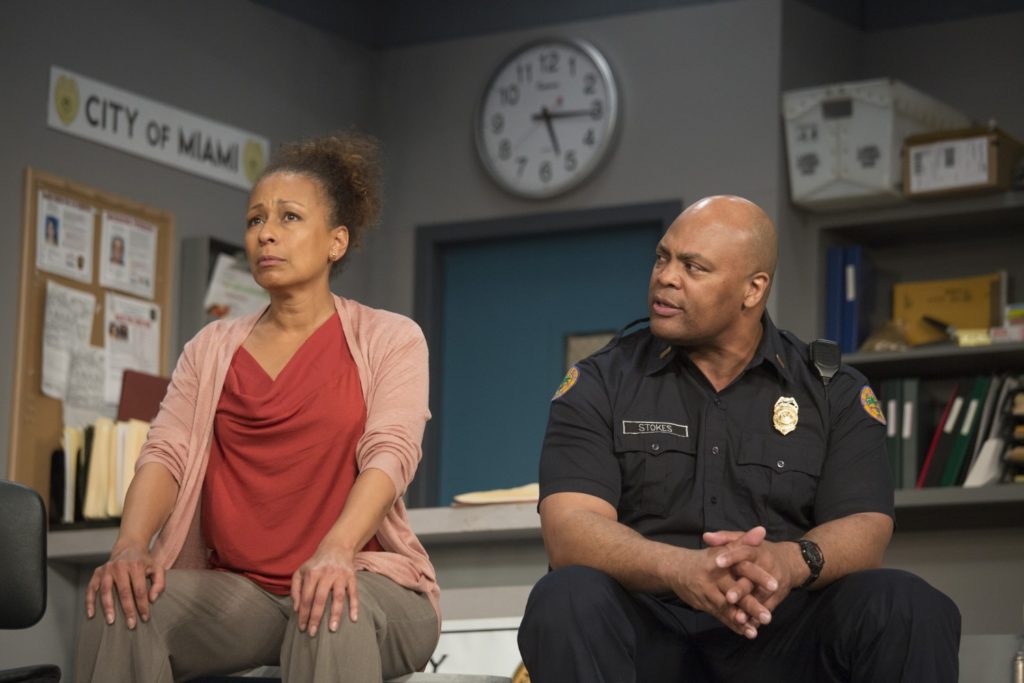Thank you, Barrington Stage Company, for reviving this past summer’s hit play American Son. Thanks because I missed it in July and was glad of the opportunity to catch up with it during its brief return engagement. And thanks, too, because this run (through Sept. 25) is accompanied by a series of school-day matinees attended by 2,000 Pittsfield high schoolers.
It’s a play that should be seen, perhaps especially by young people. Although all the characters are adults, everything revolves around the unseen title character, a black teenager who has gone missing on a summer night and, we learn as things unfold, has been involved in an unexplained “incident” after a late-night traffic stop.
Christopher Demos-Brown’s world-premiere play was commissioned for the company by its artistic director, Julianne Boyd, who also directs the production. Boyd has been fierce in her commitment to bringing plays about people of color to this largely white region – and to her essentially white audience. Last year’s Butler, about a fugitive slave and a Union Army general, and 2013’s Clybourne Park, a sequel to A Raisin in the Sun, are examples (though it’s to be noted that both of these and American Son are by white playwrights).
This one takes place in the drab waiting room of a Miami, Florida, police station in real time – we watch the clock on the cinder-block wall crawl from 4:00 to 5:45 a.m. – where Kendra Ellis-Connor, an African-American university professor, is impatiently and angrily awaiting word of her son. She bullyrags the young duty officer (an amusingly gauche Luke Smith), who can’t give her any satisfactory answers because he doesn’t know much and what he does know he’s forbidden by police protocol to disclose, pending the arrival of the (black) lieutenant who has the facts of the case (André Ware, commanding in both senses).
When Kendra’s estranged husband Scott, a white FBI agent, arrives, the stage is set for the play’s tumbling succession of intersecting revelations and contradictions.
The revelations about what happened on that midnight street, doled out piecemeal, tantalizingly, not only keep the drama tightrope-taut but serve again and again to confound our assumptions and expectations and those of the protagonists – assumptions about race most of all. Each new piece of information tilts our viewpoint, as what we mistakenly casually assumed turns out to be entirely different in fact – shocking and game-changing, yet completely credible.
The play is absorbing not just for its harrowing subject matter and its dramatic twists, but for the contradictions in the characters and the situation. They make American Son more than a “message” play and leave us unsettled and fundamentally challenged.
Kendra and Scott’s interracial relationship, though it’s now on the rocks after 20 years of marriage, is itself a challenge to the social norms that still prevail in this southern city. And while they may have different ethnic roots, both have come up from disadvantaged backgrounds to successful professional careers and are ferociously determined that their son will continue on the course they’ve set for him. He’s been educated at an exclusive private school and is expected to enter West Point, his father’s alma mater. But in the wake of Scott’s exit from the family, he has suddenly rejected all that, affecting dreads and baggy pants and, perhaps worst of all, in his father’s view at least, hanging out with other black kids.
Scott is an “Okie,” as his wife disdainfully reminds him, but has scrubbed his tongue of the hometown accent, if not quite all of its ain’ts, and has ridden his military training into a white-collar career and a no-nonsense manner that is now crumbling under this unexpected crisis. Michael Hayden’s anguished performance is a perfect summation of the sympathetic white man’s uneasy relationship with race, privilege and guilt.
It’s Kendra, though, who carries the most stunning contradictions. She’s played by Tamara Tunie – who’s most recently been seen working with the cops, as the medical examiner on Law & Order: Special Victims Unit – and it’s this woman’s conflicted nature that gives Tunie’s performance its heartrending edge.
Raised in the projects, as she reminds us repeatedly, Kendra named her son Jamal (instead of her Irish-American husband’s preference for Seamus) and reacts belligerently to any perceived racial bias. But she has made sure Jamal doesn’t “talk black” and, moving as she does in the world of white privilege and expecting to be included in its rewards, seems to have almost forgotten her own origins – to the extent that, in perhaps the play’s most breathtaking moment, she needs to be reminded by the black police officer of the street-level facts on “how to survive as a black man in this country.”
Set against the backdrop of the almost daily videos of police shootings of black men and boys (there’s a surprise in that twist in the plot, too), American Son focuses not on the inner-city parents who daily fear for their children’s lives, but on the folks who always thought they were immune. We don’t know until the very last moment of the play what has actually transpired on that dark street, although we, along with Jamal’s parents, can’t help but fear the worst.
But that final revelation is almost beside the point. What we’ve seen is two flawed people who thought they could transcend America’s social, economic and racial divisions, but now find their fragile construct fracturing.
As I said, this is a play that should be seen. But leave your own assumptions and expectations at home.
Photos by Scott Barrow
If you’d like to be notified of future posts, email StageStruck@crocker.com






